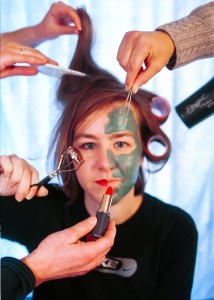Instagram celebrity Essena O’Neill quit social media at the beginning of November. O’Neill is a 19-year-old Australian who had over half a million followers on Instagram.
In many pictures, O’Neill created an illusion. She would often post selfies or pictures of herself in a swimsuit; but what her followers didn’t know was how much makeup she would put on beforehand or how she had starved herself all day to look skinny enough for a swimsuit shot.
Fake beauty comes in many forms. There are many products women can buy that are considered fake beauty. Eyelash extensions, hair extensions and dyed hair are examples.
“I do think people put negative connotations on certain beauty trends for women,” Liz Brockbank, an aesthetician in South Jordan, said.
Brockbank is a licensed aesthetician who runs her own eyelash-extension business. She has clients ranging in ages from 17 to 55.
“I love all of my clients,” Brockbank said. “I get to know them all really well because they come in here for an hour and a half every three weeks to touch up their eyelashes.”
She has 55 regular customers.
“My clients come in to get their eyelashes done mostly out of convenience I think,” Brockbank said. “I don’t think any of my clients ever represent fake beauty.”
BYU sophomore Hannah Stock said she doesn’t think makeup has a negative connotation for women.
“Makeup doesn’t make you fake,” Stock said. “It makes you look put together and that you take care of yourself.”
Stock said she thinks makeup can help raise girls’ self-esteem. She said she thinks girls who have low self-esteem won’t use makeup to enhance their looks, but rather use makeup to change their appearance.
“I feel the same way about other things people consider fake beauty,” Stock said. “If girls do have eyelash extensions or hair extensions and it is just enhancing their beauty and not changing their appearance, I think that is great.”

With the rise in social media over recent years, many studies have been conducted about the relationship between self-esteem and social media.
A study conducted by multiple professors at the University of Toledo hypothesized that those who use social media often have poorer self-esteem because of the comparisons they make on social media.
The results of the study showed that frequent visits to Facebook negatively impact self-esteem. Those who visited Facebook more often evaluated themselves more negatively.
Lee Essig is a life coach in the men’s studies research lab at BYU and helps people with self-esteem. Essig said self-esteem issues about women are relevant in the media. He said men suffer from self-esteem issues just like women do, but it’s not portrayed as much in the media. The most common self-esteem issue he has seen with BYU students is a feeling of inadequacy.
“Men do suffer from self-esteem issues just like women,” Essig said. “The self-esteem issues do vary. For men, they have issues with if they have a good job or a good major. Muscularity is another self-esteem issue for men. It is prevalent among male students here at BYU.”
Essig said men try to hide their insecurities by disconnecting socially and emotionally. The term for this is called alexithymia. For men, it can be defined more specifically as normative male alexithymia.
Haley Ahlman, a junior at BYU studying family and consumer sciences, agreed that some self-esteem issues may be heightened in the Utah Valley area compared to other universities.
“It is the necessity to be different, which is huge in Provo,” Ahlman said. “Everyone tries so hard to be different that they all end up the same.”
Many out-of-state students who attend BYU were at the top of their classes in high school. Some also come from communities with a low concentration of members of the church.
“All of a sudden, these students went from being so unique being Mormon and the only ones who dressed modestly, to being thrown into a school with 30,000 of the exact same people,” Ahlman said.
With BYU’s unique culture, other self-esteem issues may arise that wouldn’t be seen at other universities.
“I have seen that many students have a common misconception that if they are living a righteous life that they should automatically be happy,” Essig said.
He said if these students aren’t happy, then they think the best way to solve the problem is religiously through prayer, scripture study and temple attendance.
“I am not saying anything bad about these things, they are all great,” Essig said. “But sometimes it’s okay to cope with these things in better ways, which may involve a counselor. There is nothing wrong with that.”
BYU offers counseling and psychological services in the Wilkinson Center. The counseling center is open Monday through Friday 8 a.m. to 5 p.m. and offers individual counseling, group therapy, couples therapy, consultations and emergency services.




